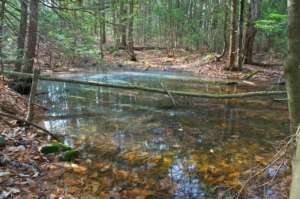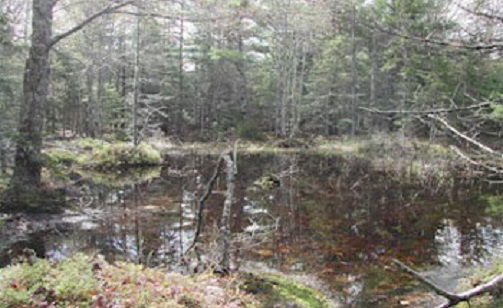SCORES & OUTDOORS: What happens in those vernal pools of spring
 by Roland D. Hallee
by Roland D. Hallee
Like an idiot, I decided to stop into the office on my way to camp on Sunday. However, every chore has its rewards. On our way to camp afterwards, I noticed a small vernal pool in its customary spot on the Cross Hill Road, in Vassalboro. It’s always there, but it’s usually dried up during the summer. Vernal pools are a very important occurrence in our ecosystem. Let’s take a look at what actually happens there.
Vernal pools, also called vernal ponds, are temporary pools of water that provide habitat for distinctive plants and animals. They are considered to be a distinctive type of wetland usually devoid of fish, and thus allow the safe development of amphibian and insect species unable to withstand competition or predation by fish.
Despite being dry at times, vernal pools teem with life when filled. The most obvious inhabitants are various species of breeding frogs and toads. Some salamanders also utilize vernal pools for reproduction, but the adults may visit the pool only briefly. Other notable inhabitants are Daphnia and fairy shrimp, the latter often used as an indicator species to decisively define a vernal pool. Other indicator species, at least in New England, are the wood frog, the spadefoot toad, and some species of mole salamanders. Certain plant species are also associated with vernal pools, although the particular species depend upon the region.
 Vernal pools are shallow depressions that usually contain water for only part of the year. In the Northeast, vernal pools may fill during the fall and winter as the water table rises. Rain and melting snow also contribute water during the spring. Vernal pools typically dry out by mid to late summer. Although vernal pools may only contain water for a relatively short period of time, they serve as essential breeding habitat for certain species of wildlife, including salamanders and frogs. Since vernal pools dry out on a regular basis, they cannot support permanent populations of fish. The absence of fish provides an important ecological advantage for species that have adapted to vernal pools, because their eggs and young are safe from predation.
Vernal pools are shallow depressions that usually contain water for only part of the year. In the Northeast, vernal pools may fill during the fall and winter as the water table rises. Rain and melting snow also contribute water during the spring. Vernal pools typically dry out by mid to late summer. Although vernal pools may only contain water for a relatively short period of time, they serve as essential breeding habitat for certain species of wildlife, including salamanders and frogs. Since vernal pools dry out on a regular basis, they cannot support permanent populations of fish. The absence of fish provides an important ecological advantage for species that have adapted to vernal pools, because their eggs and young are safe from predation.
Species that must have access to vernal pools in order to survive and reproduce are known as “obligate” vernal pool species. In Maine, obligate vernal pool species include wood frogs, spotted and blue-spotted salamanders (two types of mole salamanders) and fairy shrimp. While wood frogs and mole salamanders live most of their lives in uplands, they must return to vernal pools to mate and lay their eggs. The eggs and young of these amphibians develop in the pools until they are mature enough to migrate to adjacent uplands. Fairy shrimp are small crustaceans which spend their entire life cycle in vernal pools, and have adapted to constantly changing environmental conditions. Fairy shrimp egg cases remain on the pool bottom even after all water has disappeared. The eggs can survive long periods of drying and freezing, but will hatch in late winter or early spring when water returns to the pool.
Not all vernal pool habitats are considered “significant”. In general, a vernal pool habitat is significant if it has a high habitat value, either because a state-listed threatened or endangered species, such as a spotted turtle, or a rare species, such as a ribbon snake, uses it to complete a critical part of its life history, or there is a notable abundance of specific wildlife, such as blue spotted salamander, wood frog, or fairy shrimp.
Do you have a vernal pool on your property and don’t know whether it is significant? The specific criteria describing a significant vernal pool are listed in DEP Rules, Chapter 335, and allow these resources to be identified in the field. Using these criteria, a person who has experience and training in either wetland ecology or wildlife ecology may identify and document a significant vernal pool; or the DEP may provide a written determination concerning whether or not a vernal pool habitat is significant.
“Significant vernal pool habitat” includes the vernal pool itself and the area within a 250-foot radius of the spring or fall high water mark of the pool, which is considered critical terrestrial habitat.
Since September 1, 2007, significant vernal pool habitat is protected by law under the Natural Resources Protection Act (NRPA). An activity in, on, or over these areas must avoid unreasonable impacts on the significant vernal pool habitat and obtain approval from the DEP, through a Permit by Rule or individual NRPA approval.
A permit by rule will be available if certain standards are met, and can be approved within 14 days. The standards do not create a mandatory setback or no-build zone, but do affect what can be done, so it is advisable to plan ahead. For more information on the NRPA, a copy of the rules addressing significant vernal pools, application forms, and related materials, see the NRPA page.
If you have questions, need hard copies of materials, or would like to request a field determination, contact your nearest DEP regional office, and ask to speak to the “on-call” person in the Land & Water Bureau, Division of Land Resource Regulation.
The Central Maine Regional Office is located at 17 State House Station, Augusta, ME 04333-0017; Phone: 207-287-7688 or 1-800-452-1942.
Roland’s trivia question of the week:
Which pitcher, who started for the Red Sox in the 1986 World Series, later enjoyed success coaching the Chinese national team?
Responsible journalism is hard work!
It is also expensive!
If you enjoy reading The Town Line and the good news we bring you each week, would you consider a donation to help us continue the work we’re doing?
The Town Line is a 501(c)(3) nonprofit private foundation, and all donations are tax deductible under the Internal Revenue Service code.
To help, please visit our online donation page or mail a check payable to The Town Line, PO Box 89, South China, ME 04358. Your contribution is appreciated!



Leave a Reply
Want to join the discussion?Feel free to contribute!